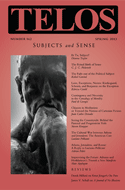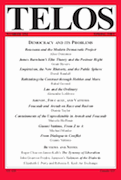Rahul Govind’s “The Fade-out of the Political Subject: From Locke to Mill” appears in Telos 162 (Spring 2013). Read the full version online at the Telos Online website, or purchase a print copy of the issue in our store.
 The following essay takes as its conceptual core an investigation into the relation between time and political subjectivity, which is undertaken through a reading of John Locke and John Stuart Mill. The latter’s theorization of liberty and progress is contrasted to the former’s understanding of the political subject via an eschato-theological understanding of time. Ultimately Mill’s position—as a “stand-in” for modernity—will be found to be unjustifiable in its uncritical distinguishing between time and the (political) subject, thereby laying the groundwork for what is perhaps the dominant paradigm of political philosophy today: political not metaphysical. A subplot in the essay argues that Mill’s well-known endorsement of British imperialism can be traced to these problems besetting the theoretical relations between political liberty, time, and notions of progress. Through a constructive reading of Mill (finding echoes and cross-stitching the System of Logic and his political writings) and Locke (finding echoes and cross-stitching the Treatises and Reasonableness of Christianity), we hope to revisit the problem of the political subject though time. In the light of this, the conclusion engages the work of Foucault and Koselleck as they “overlap” in an evaluation of modernity in its temporal articulation.
The following essay takes as its conceptual core an investigation into the relation between time and political subjectivity, which is undertaken through a reading of John Locke and John Stuart Mill. The latter’s theorization of liberty and progress is contrasted to the former’s understanding of the political subject via an eschato-theological understanding of time. Ultimately Mill’s position—as a “stand-in” for modernity—will be found to be unjustifiable in its uncritical distinguishing between time and the (political) subject, thereby laying the groundwork for what is perhaps the dominant paradigm of political philosophy today: political not metaphysical. A subplot in the essay argues that Mill’s well-known endorsement of British imperialism can be traced to these problems besetting the theoretical relations between political liberty, time, and notions of progress. Through a constructive reading of Mill (finding echoes and cross-stitching the System of Logic and his political writings) and Locke (finding echoes and cross-stitching the Treatises and Reasonableness of Christianity), we hope to revisit the problem of the political subject though time. In the light of this, the conclusion engages the work of Foucault and Koselleck as they “overlap” in an evaluation of modernity in its temporal articulation.
 The following essay is an investigation into the nature of the contract, the way in which the contract indexes “right” and equality, and the textual and historical expressions—as well as echoes—that this has taken from Thomas Hobbes to Karl Marx. The opening set of conceptual remarks lead to a reading of Hobbes’s Leviathan and Marx’s “On the Jewish Question,” arguing that both texts were concerned with theoretically explicating the relationship between right and equality, germane to which was the problematic of the “nation”/community, which was itself conceived via the “Jewish question.” The essay argues that only an attention to Marx’s reformulation of the older problematic, as found in Hobbes, will help us understand the significance of his critique of the (post–)French Revolutionary theory of abstract right, and thereby the need for the development and critique of the field of political economy. Through this exposition of the thread between the conceptualization of the political and political economy, it seeks to reconfigure the canonical texts of Hobbes and Marx in rethinking the interrelations between right, equality, and community within a historico-philosophical horizon.
The following essay is an investigation into the nature of the contract, the way in which the contract indexes “right” and equality, and the textual and historical expressions—as well as echoes—that this has taken from Thomas Hobbes to Karl Marx. The opening set of conceptual remarks lead to a reading of Hobbes’s Leviathan and Marx’s “On the Jewish Question,” arguing that both texts were concerned with theoretically explicating the relationship between right and equality, germane to which was the problematic of the “nation”/community, which was itself conceived via the “Jewish question.” The essay argues that only an attention to Marx’s reformulation of the older problematic, as found in Hobbes, will help us understand the significance of his critique of the (post–)French Revolutionary theory of abstract right, and thereby the need for the development and critique of the field of political economy. Through this exposition of the thread between the conceptualization of the political and political economy, it seeks to reconfigure the canonical texts of Hobbes and Marx in rethinking the interrelations between right, equality, and community within a historico-philosophical horizon. 






